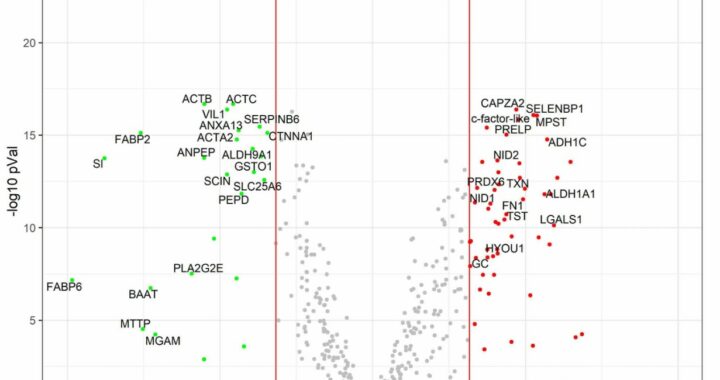New paper on microbiota of chickens and their environment – review in Avian Diseases, January 2023
A new review paper from our production has been accepted for publication in the Avian Diseases. This review introduces bacterial flora in different chicken organs as well as in their environment. As is the case in our reviews, we have decided for less standard and rather challenging review in which we mention alternative views and challenging associations. The challenging approach is not a purpose for itself. Instead, reason for such style is to force readers to think, to agree (better possibility) or to disagree, to get readers out of their daily comfort of routine way of thinking. One example of alternative idea presented in the review is the information that E. coli is not a species adapted to intestinal tract. Instead, E. coli dominates in chicken environment from where it enters intestinal tract. There are more alternative ideas in this review. If you are ready to think differently, find the original paper here.
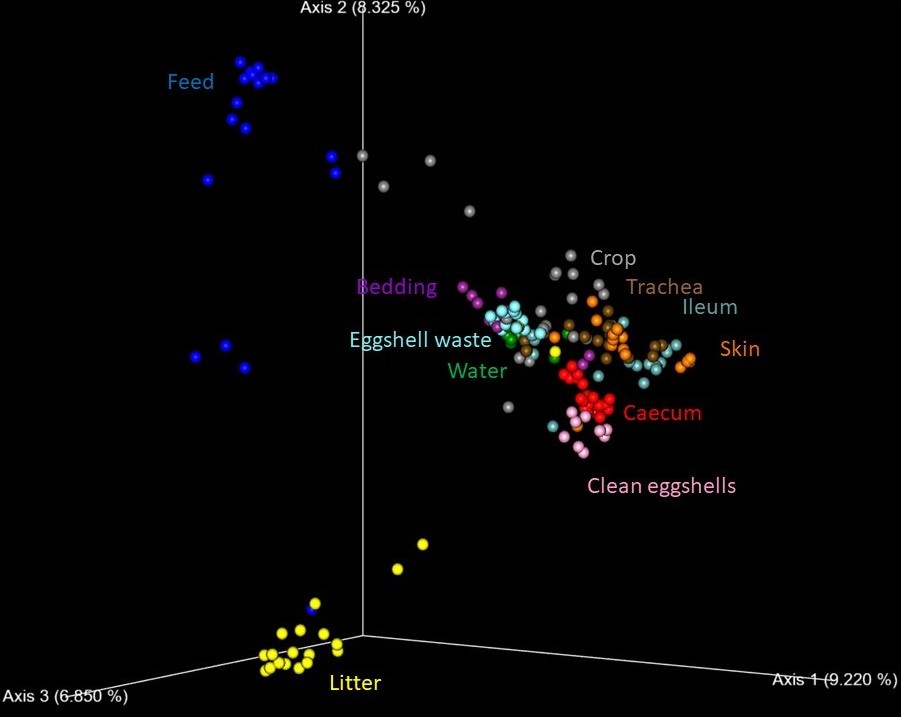
Probiotic mixture for protection of chickens against pathogenic E. coli – new publication January 2023
New paper on the protection of chickens by defined probiotic mixtures consisting of strict gut anaerobes against pathogenic E. coli has been just accepted for publication in the Poultry Science. Although we successfully test different defined mixtures of strict gut anaerobes in a protection of chickens against Salmonella, the first published paper reports on the viability of such concept in a protection of chickens against pathogenic E. coli. Currently we prepare the first product of this type for registration in the Czech Republic in 2023, and this will be followed by its commercial distribution immediately after. Information on the ability to suppress infection by pathogenic E. coli can be found here.
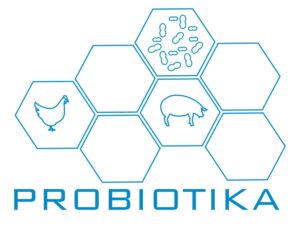
New paper on litter microbiota in chicken production
A new paper on the development of litter microbiota in chicken production has been accepted in the Applied and Environmental Microbiology in which we describe a time-dependent development. Escherichia coli, Staphylococcus saprophyticus, and Weissella jogaejeotgali were characteristic of fresh litter during the first month of production. Corynebacterium casei and Lactobacilli dominated in a 2-month-old litter, Brevibacterium, Brachybacterium, and Sphingobacterium were characteristic for 3-month-old litter, and Salinococcus, Dietzia, Yaniella, and Staphylococcus lentus were common in a 4-month-old litter. Identification of the species present in the litter opens the possibility for active manipulation of litter microbiota, something what we are already working on.

New paper comparing chicken, pig and human gut microbiota
We have published a new paper comparing chicken, pig, human and even Antarctic penguin microbiota in the Microorganisms journal. Apparently strange idea has brought interesting findings. We have found out that bacteria belonging to phylum Bacteroidetes exhibit host adaptation while representatives of phylum Firmicutes were usually broadly distributed among different hosts. Host adaptation is not directly associated with taxonomic classification but correlates with the ability of gut anaerobes to survive in external environment. Bacterial species exhibiting some form of their existence resistant to aerobic environment may survive outside eukaryotic host and easily spread to another host. Since Firmicutes include spore forming Clostridiales and aerotolerant Bacillales, global distribution among different hosts is typical for them. On the other hand, anaerobic bacteria from phylum Bacteroidetes usually do not exhibit any form of their existence in aerobic environment and therefor spread only over a short distance, usually by contact among individuals of the same host species. This favours host adaptation and speciation what is indeed observed in these bacteria. Such findings may be important for the development of novel types of probiotics. In host adapted gut microbiota species it is recommended to consider their host preference. On the other hand, origin of probiotic strain is less important in the host non-adapted specie. However, to respect natural ecology of host non-adapted species, i.e. their permanent supply from environment, such probiotics should be provided for prolonged period of time, either via drinking water or feed.
For more information, click here.
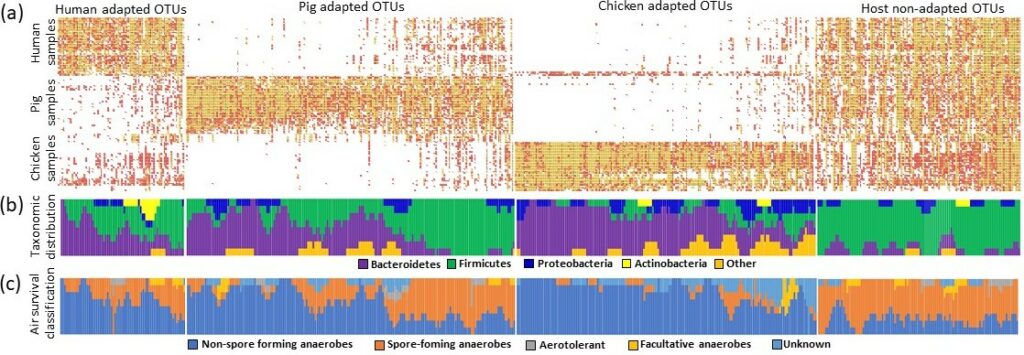
Miniconference INPOMED
A miniconference presenting final results achieved during INPOMED project was arranged on May 23, 2022 at the Veterinary Research Institute, Brno, Czech Republic. Recordings of all presentations can be seen here.
INPOMED webinar
Dear colleagues,
on March 22, 2022, as a part of Interreg supported INPOMED project we organised an on-line webinar. The first presentation was given by Prof. Bernd Kaspers from Ludwig-Maximilians University Munich and was be focused on the importance of gut microbiota on the development of gut immune system. Second invited presentation was delivered by prof. Silke Rautenschlein from University of Veterinary Medicine Hannover covering a topic of Campylobacter interactions with chicken host. Following invited speaker’s presentations, results of INPOMED project partners were introduced in a form of four brief presentations. We hope that you have learnt at least something new and inspirative for you.
For the full recording of the whole webinar, click here.
INPOMED project on-line seminar
Dear colleagues,
it is our pleasure to announce that on March 22, 2022, from 1 p.m. to 3 p.m., on-line webinar will be organised. The seminar is part of the Interreg supported INPOMED project „INPOMED – Innovations in Poultry Medicine“. Seminar will start with two presentations by invited speakers. The first presentation will be given by Prof. Bernd Kaspers from Ludwig-Maximilians University Munich and will be focused on the importance of gut microbiota on the development of gut immune system. Second invited presentation will be delivered by prof. Silke Rautenschlein from University of Veterinary Medicine Hannover covering a topic of Campylobacter interactions with chicken host. Following invited speaker’s presentations, results of INPOMED project partners will be introduced in a form of four brief presentations. All presentations will be in English though questions can be raised in English, German or Czech language. We are looking forward to meet you on-line on March 22 at 1 p.m.
Direct Meeting Link: https://vyzkumnyustavveterinarniholekarstvi.my.webex.com/vyzkumnyustavveterinarniholekarstvi.my-cs/j.php?MTID=mb9e6feceb6846d258f0293de1a24603d
OR
Meeting Link: https://vyzkumnyustavveterinarniholekarstvi.my.webex.com/
Meeting number: 2364 863 9206
Password: Dfbp526rVpu
Seminar programme in English, German or Czech can be downloaded here.
Lactobacilli as probiotics for poultry
Lactobacilli are generally accepted as beneficial microbes. Despite this, in our hands, lactobacilli do not permanently colonise chicken intestinal tract and do not protect chickens against Salmonella Enteritidis challenge. We have repeatedly shown that if lactobacilli and Salmonella meet each other for the first time as late as in the chicken crop, lactobacilli administration does not lead to protection of chickens against Salmonella. However, if lactobacilli and Salmonella are simultaneouysly inoculated to chicken feed and conditions are set so that fermentation may proceed, metabolic activity of lactobacilli leads to decrease in pH and suppression of Salmonella viability. The most common and frequent probiotic effect of lactobacilli as probiotics is therefore expressed as fermentation and decrease in pH what results in suppression of other microbiota viability including pathogens like Salmonella. For more details, see HERE.
Influence of lincomycin-spectinomycin treatment on the outcome of Enterococcus cecorum infection and on the cecal microbiota in broilers
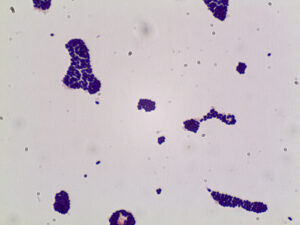
Enterococcus cecorum (EC) is one of the main reasons for skeletal disease in meat type chickens. Intervention strategies are still rare and focus mainly on early antibiotic treatment of the disease, although there are no data available concerning the effectivity of this procedure. The present study aimed to investigate the efficacy of early lincomycin-spectinomycin treatment during the first week of life after EC-infection. Furthermore, the impact of lincomycin-spectinomycin treatment and EC infection on the development of cecal microbiota was investigated. For more information, see here.
Protein expression in chicken ileum and caecum
It is clear that function of ileum and caecum is different. However, to answer a simple question how these two compartments of intestinal tract differ is not so simple. This why we addressed this topic and what we have found out, you can find in the following paper Volf_Animals.
